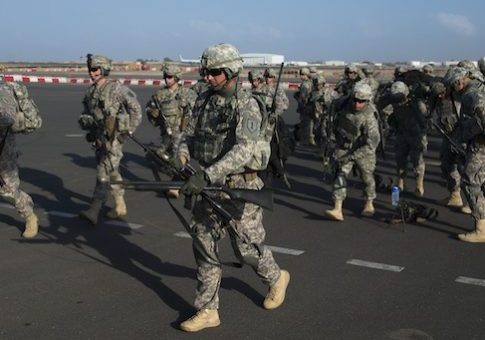The $1.1 trillion omnibus spending bill introduced Monday evening leaves the vast majority of pension cuts to military retirees intact, only exempting disabled veterans from the controversial provision included in last month’s budget deal.
The spending bill amends a section of the bipartisan budget agreement that hit the military with reduced retirement pay, while also leaving generous benefits for civilian federal retirees untouched.
The new spending bill, negotiated by House Appropriations Committee Chairman Hal Rogers (R., Ky.) and Chairwoman of the Senate Appropriations Committee Barbara Mikulski (D., Md.), would only restore retirement benefits for 17.5 percent of military retirees.
Title X of the bill exempts veterans who receive Chapter 61 retirement. Chapter 61 applies to combat veterans who are disabled as a result of their service. The spouses of deceased veterans will also be exempt, according to section 10001 of the legislation.
However, the bill keeps in place the one percent decrease in the cost-of-living adjustments (COLA) for all other military retirees. The change, effective December 2015, affects retirees under the age of 62 and will result in thousands of dollars in lost retirement pay.
Enlisted servicemembers could lose a minimum of $72,000 over a 20 year period of their retirement, while commissioned officers could face up to $124,000 in lost compensation.
The bill does remove the most controversial element of the budget deal: The failure to exempt disabled veterans from the cuts. The bipartisan budget agreement, crafted by House Budget Committee Chairman Paul Ryan (R., Wis.) and Senate Budget Committee Chairwoman Patty Murray (D., Wash.), had initially promised that servicemembers who retired because of disability or injury would not be affected.
Sen. Jim Inhofe (R., Okla.) told the Washington Free Beacon that while he is pleased that disabled veterans would no longer face cuts, he will continue to work to restore military pensions for all retirees.
"The fact that we even have to take efforts to restore these retirement benefits in the first place is troubling," he said. "This is a benefit these men and women were promised when they joined the services and earned by dedicating their lives to protect our national security."
"I'm glad the omnibus bill restores benefits for disabled veterans and spouses of those who have died in harms way," Inhofe said. "But we should be restoring our full promise to our service members, and I will be working to ensure this happens."
Disabled veterans, in fact, account for just 4.2 percent of all military retirees. According to the Congressional Research Service (CRS), there were a total of 2,214,000 retirees in fiscal year 2010, costing $50.12 billion.
Of that total, 93,000 received disability retirement, representing 4.2 percent of all military retirees. There were 294,000 survivor benefit recipients in FY 2010 who would also be exempt from the cuts in the omnibus bill, costing $3.65 billion.
Disabled veterans and spouses of deceased servicemembers account for 17.5 percent of military retirees. Therefore, 82.5 percent of retirees would still face the reduction in their COLA’s.
Numerous bills have been introduced in Congress to restore pensions for all military retirees. The preferred idea among Republicans is to replace the estimated $6 billion in savings from the military retirement cuts by closing a loophole in the tax code that allows illegal aliens to receive tax credits.
A fix originally proposed by Sen. Jeff Sessions (R., Ala.), Sen. Kelly Ayotte (R., N.H.) also offered a bill that would require a Social Security number in order for an individual to receive the Additional Child Tax Credit. The requirement would save approximately $20 billion over 10 years.
Ayotte was blocked by Senate Democrats last week when offering her bill as an amendment to legislation to extend unemployment insurance benefits.
Democrats have opposed paying for the repeal of the military pension cuts by addressing the tax loophole. Sen. Carl Levin (D., Mich.), chairman of the Senate Armed Services Committee, backed away from his support of Ayotte’s bill once he learned how the legislation offset the cuts.
"There are better ways for us to save these funds, such as closing the tax credit loophole for illegal immigrants," Sen. Sessions said in a statement. "Unfortunately, Leader Reid and his conference blocked my effort to implement this fix during the budget debate in December."
"I hope the majority will allow us to make this fix and stop shielding these illicit tax payments," he said. "In order to end annual deficits all of us will have to tighten our belts, but our military personnel must not disproportionately bear the burden."
The House is expected to vote on the omnibus bill on Wednesday.
